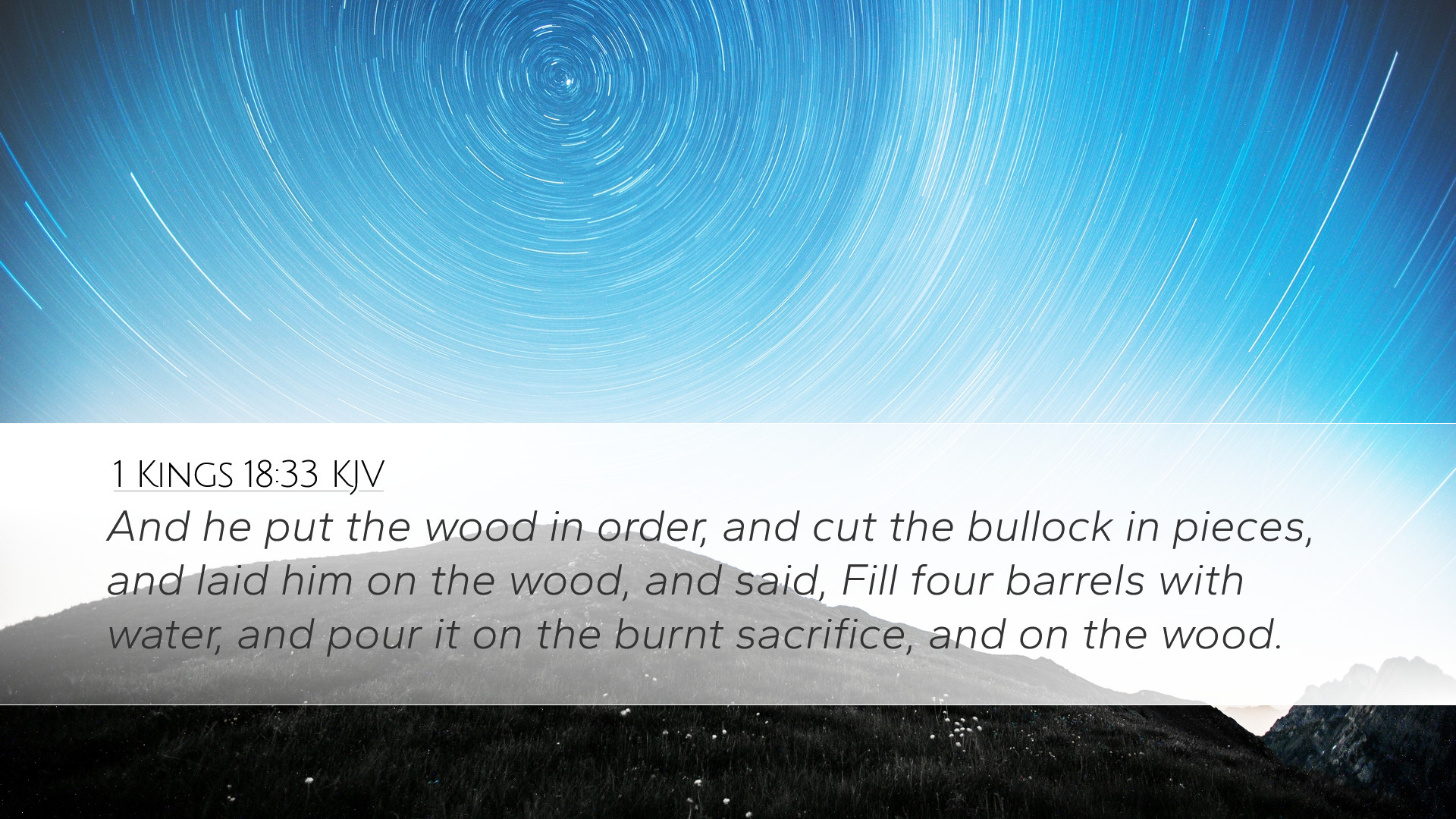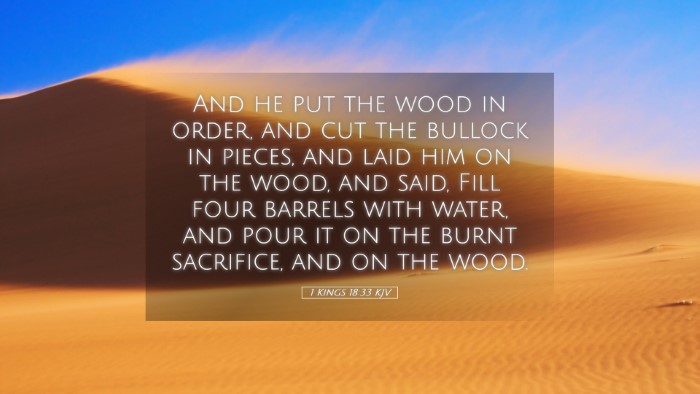Commentary on 1 Kings 18:33
Bible Verse: "And he put the wood in order, and cut the bullock in pieces, and laid him on the wood, and said, Fill four barrels with water, and pour it on the burnt sacrifice, and on the wood."
Contextual Background
This verse occurs within the narrative of Elijah's confrontation with the prophets of Baal on Mount Carmel. The ambiance is charged with spiritual tension as Elijah seeks to prove the sovereignty of Yahweh against the backdrop of Israel's idolatry. This moment underscores a critical juncture in Israel’s history, where the loyalty of the people to the living God is explicitly challenged.
Interpretative Insights
The act of preparing the altar and the sacrifice reflects Elijah’s commitment to ensuring that the demonstration of God's power is unmistakable and unequivocal. Here are some interpretive insights from prominent public domain commentaries:
- Matthew Henry: Henry underscores the meticulousness of Elijah’s actions. The deliberate arrangement of the wood and the sacrifice indicates not only reverence for God’s requirements but also a contrast to the chaotic rites of Baal worship. By soaking the altar with water, Elijah seeks to amplify the miraculous nature of God’s intervention.
- Albert Barnes: Barnes highlights the significance of the water in this preparatory act. In a time of drought, such an act would have been particularly provocative, demonstrating absolute faith in God's ability to respond, regardless of circumstances. This reliance on God’s provision, seen in the contrast of the prophets of Baal who operate in futility, reveals a profound truth about faith in action.
- Adam Clarke: Clarke meticulously examines the symbolic elements of the passage. The bullock, representing a significant sacrifice, communicates the seriousness of the situation. The cutting of the bullock into pieces is both an act of obedience to the sacrificial laws and a foreshadowing of the total destruction of Baal’s prophets soon to follow. Clarke emphasizes that the pouring of water served to demonstrate that the offering, when consumed, is indeed an act of divine intervention, leaving no doubt about the authenticity of God's response.
Theological Implications
This passage invites deep theological reflections, particularly concerning the nature of true worship versus idolatry. In a culture rife with distractions, Elijah’s actions serve as a stark reminder of the necessity for clear delineation between worship of the one true God and the competing ideologies that vie for allegiance.
1. Divine Sovereignty
The act of soaking the sacrifice with water underscores God’s ultimate sovereignty over creation. As noted by Henry, the challenge set forth serves to reveal not only God’s power but His willingness to respond to His people’s faith.
2. The Nature of Sacrifice
Clarke remarks on the significance of the bullock, which reminds modern readers of the requisite nature of sacrifice in authentic worship. The effort put into arranging the wood and preparing the sacrifice implies that genuine worship requires intention and devotion.
3. Contrast with Baal Worship
Barnes emphasizes the contrasting methodologies between Elijah and the prophets of Baal. The latter’s frantic rituals indicate desperation, while Elijah’s calm, methodical preparations reflect faith grounded in a relationship with God rather than mere performance.
Practical Applications for Pastors and Leaders
For those in pastoral leadership or theological study, this verse provides several actionable insights:
- Commitment to Authentic Worship: Leaders should evaluate their communities' worship practices to ensure that they reflect genuine reverence and faith. Elijah’s example encourages an approach that centers on God’s power rather than on human effort.
- Faith amid Adversity: The radical step of dousing the altar with water encourages believers to trust deeply in God's provision, especially in bleak circumstances. Pastors can draw on this narrative to inspire congregations facing trials.
- Preparation for God's Answer: The preparation Elijah undertakes is an illustration for churches today about the importance of readiness for God’s work. This may involve prayer, community preparation, and faith-based planning for divine intervention.
Conclusion
1 Kings 18:33 encapsulates crucial elements fundamental to understanding the broader narrative of God's covenant faithfulness. As interpreted through the insights of Matthew Henry, Albert Barnes, and Adam Clarke, this verse is not merely a record of an event but a profound lesson in faith, sacrifice, and the unmatched power of the living God to respond to His people.


